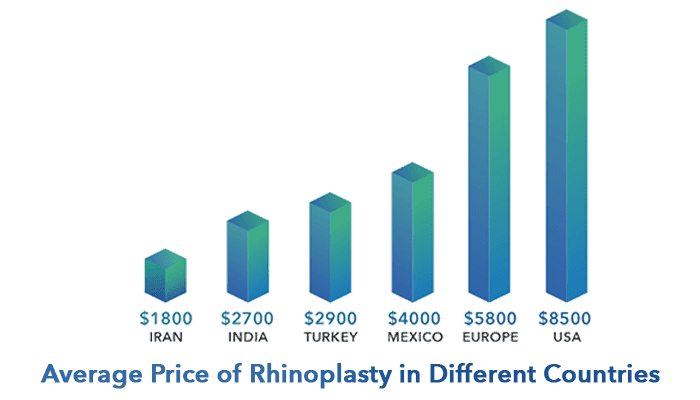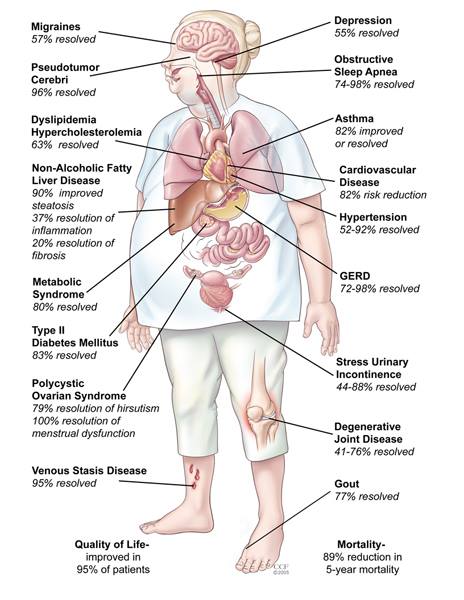Weight-loss surgery: Is it an option for you?
Weight-loss surgery changes the shape and function of your digestive system. This surgery may help you lose weight and manage medical conditions related to obesity. These conditions include diabetes, obstructive sleep apnea, and risk factors for heart disease and stroke.
Weight-loss surgery is also known as bariatric surgery. There are various surgical procedures, but all of them help you lose weight by limiting how much food you can eat. Some procedures also limit the amount of nutrients you can absorb.
In the U.S., the most common weight-loss surgery is sleeve gastrectomy. In this procedure, the surgeon removes a large portion of the stomach to create a tubelike sleeve.
Weight-loss surgery is only one part of an overall treatment plan. Your treatment will also include nutrition guidelines, exercise and mental health care. You’ll need to be willing and able to follow this long-term plan to achieve your weight-loss goals.
If you’re considering weight-loss surgery, you’ll meet with a number of specialists to help you decide if weight-loss surgery is an option for you
WHAT WE OFFER
- Weight Loss Surgery
Clinic and doctor visits, Weight Loss surgery in hospital, one-night hospitalization, post-operative care, medicines*, recovery, and follow-up - E-Visa Authorization Code
E-visa authorization code. (Note that there is a separate visa fee that the patient must pay when receiving the visa, which it is not part of this package).
- Pick-up & Transfer
Airport pick-up, private transfer from hotel to clinic/hospital and vice versa - Accommodations
8 nights stay in a three-star to five-star hotel offered which is preferably near the clinic or hospital
- Other Services
24-hour on-call assistance, interpreter, SIM card and internet
Note:
* The medicines and other aftercare items included in this package are the necessary items prescribed by the surgeon. Also, the doctors and hotels and clinics which are included in the package are offered by SinoheMedTour to the patient. There may be other doctors whom the patients are considered and the price might be different. It is highly recommended to bring a companion with you for this surgery as it will facilitate your stay and recovery after the surgery.
It is highly recommended to take endoscopy test in order to verify your stomach health so that it is free of ulcer or helicobacter pylori since any issue with these may lead to the cancellation of the surgery and this is the patient’s liability.
You need to use medicine and supplementary vitamins after the surgery which the patient is responsible for all the expenses. Finally, please note that the prices are valid for those who are below 130 Kg and for the others you need to contact to get the detailed price. Based on a new policy of the Ministry of Foreign Affairs, the citizens of the USA, UK, and Canada are included in different logistic services.
Why is bariatric surgery done?
Bariatric surgery is the most successful long-term treatment for class III obesity. According to the National Institutes of Health (NIH), it is nearly impossible for people with class III obesity to sustain weight loss through diet and exercise alone. Once your body has registered your higher weight as “normal,” it continues to try to return to that weight. Bariatric surgery works by changing how your body manages what you eat, allowing healthy diet and lifestyle changes to be effective for sustained weight loss and health.
What kinds of conditions can bariatric surgery treat?
Obesity is associated with many chronic diseases, many of which can be life-threatening. These conditions and risk factors greatly improve after surgery and weight loss. If you’re a candidate for bariatric surgery, you may already have or be at risk of developing any of these diseases, including:
- High cholesterol. Hyperlipidemia (high cholesterol) means your blood has too many lipids (fats) in it. These can add up and lead to blockages in your blood vessels. This is why high cholesterol can put you at risk for a stroke or heart attack.
- High blood pressure. Hypertension (high blood pressure) means the force of blood flowing through your blood vessels is too high. This wears down the walls of your blood vessels and puts you at greater risk of heart attack and stroke.
- High blood sugar. Hyperglycemia (high blood sugar) is highly linked to insulin resistance and is considered a precursor to diabetes. Left untreated, it can damage your nerves, blood vessels, tissues and organs, increasing your risk of many diseases.
- Type 2 diabetes. Excess fat storage can lead to insulin resistance, which can lead to adult-onset diabetes (type 2). The risk of developing type 2 diabetes increases by 20% for each 1 point increase on the BMI (body mass index) scale.
- Heart disease. Obesity can lead to impaired cardiac function and congestive heart failure. It can also cause plaque to build up inside your arteries and increases your risk of heart attack and stroke.
- Kidney disease. Metabolic syndromes associated with obesity, including high blood pressure, insulin resistance and congestive heart failure, are major contributors to chronic kidney disease and kidney failure.
- Obstructive sleep apnea. People with untreated sleep apnea stop breathing repeatedly during their sleep when their upper respiratory tract becomes blocked. These episodes reduce oxygen flow to the vital organs and particularly endanger the heart.
- Osteoarthritis. Having excess weight puts extra pressure on joints like your knees. This makes it more likely that you’ll develop osteoarthritis, a degenerative joint disease, or make it worse if you already have it.
- Non-alcohol related fatty liver disease (NAFLD). NAFLD occurs when your body begins depositing excess fat in your liver. It can lead to non-alcohol related steatohepatitis (NASH), chronic inflammation that can do long-term damage to your liver.
- Cancer. While the connection isn’t entirely understood, obesity is correlated with an increased risk of acquiring more than a dozen types of cancer. It also increases your risk of death from cancer by more than 50%.
What qualifies you for bariatric surgery?
Bariatric surgery requirements begin with establishing a diagnosis of class III obesity. That means that you either:
- Have a BMI of 40 or higher. The Body Mass Index (BMI) is a way of estimating how much body fat you have based on your height-to-weight ratio. A score of 40 or higher is associated with a high risk of related diseases. It usually equates to about 100 lbs. overweight.
- Have a BMI of at least 35 and at least one related health problem. A BMI of 35 without a related health problem is considered class II obesity.
The criteria are slightly higher for adolescents. An adolescent may be a candidate if they have:
- BMI of at least 40 and an obesity-related medical condition.
- BMI of at least 35 and a severe obesity-related medical condition.
While BMI is easily measured, you may have to take some medical tests to diagnose your obesity-related health conditions.
How to know if you’re ready for surgery
If you’re considering weight-loss surgery, you’ll meet with a health care team that may include the following:
- Primary care doctor
- Surgeon
- Anesthesiologist
- Dietitian
- Nurse specializing in weight management
- Psychologist or psychiatrist
- Other specialists depending on your medical conditions
Members of your team will explain what to expect before and after the procedure. They will evaluate whether you’re ready for surgery and help you decide if it’s an option for you. They may identify concerns to address — medical, behavioral or psychological — before you’re ready for surgery.
What are the different types of bariatric surgery?
Gastric sleeve
The gastric sleeve, also called sleeve gastrectomy, is the most commonly performed bariatric surgery in the U.S. This may be because it’s a relatively simple procedure that’s safe to perform on most people with little risk of complications. The gastrectomy simply removes a large portion of your stomach — about 80% — leaving behind a small, tubular portion, like a sleeve. This naturally reduces the amount of food you can consume in one sitting and makes you feel fuller faster. But it also reduces the hunger hormones that are normally produced in your stomach. This helps to stabilize your metabolism, decreasing your appetite and regulating your blood sugar.
Gastric bypass
The gastric bypass is also known as the “Roux-en-Y,” which is a French term meaning “in the form of the letter Y.” With this procedure, your small intestine will end up in that form. First, surgeons create a small pouch at the top of your stomach, separating it from the lower portion with surgical staples. Then they divide your small intestine and bring the new segment up to connect to the stomach pouch. Food will now flow through the new, smaller stomach and lower segment of your small intestine, bypassing the rest. This restricts how much your stomach can hold and also how much nutrition your small intestine can absorb. Restricting the small intestine makes this method more effective than gastric restriction alone.
Biliopancreatic Diversion with Duodenal Switch (BPD-DS)
This is the original version of the duodenal switch, an operation that combines a sleeve gastrectomy with an intestinal bypass. (It sometimes goes by a shorter name: Gastric Reduction Duodenal Switch). It’s similar to the Roux-en-Y gastric bypass but more extreme. This operation bypasses most of your small intestine — about 75%. This significantly reduces the hunger hormones produced in your small intestine as well as in your stomach. It also significantly restricts how much nutrition your small intestine can absorb. This is what makes the duodenal switch the most effective surgery for weight loss and for improving metabolic syndromes like diabetes. But it can also make it hard for your body to absorb enough nutrients to stay healthy.
Stomach Intestinal Pylorus Sparing Surgery (SIPS)
This newer procedure is a modified version of the original duodenal switch, intended to reduce complications. It also goes by the names Loop Duodenal Switch or SADI-s. Early results are still being studied, but so far it appears promising that this version may eventually replace the original duodenal switch. Like the original, it begins with a sleeve gastrectomy, then divides the first part of the small intestine just after the stomach (the duodenum). This time, the small intestine is reattached as a loop, which requires just one surgical connection (anastomosis) instead of two. It also means that less of the small intestine is bypassed, allowing for a little more absorption of nutrients.
What kind of postoperative care will I have after weight loss surgery?
During the first year after your surgery, your healthcare provider will see you regularly for follow-up visits and testing. They will take metabolic blood tests to monitor how your health is improving and screen for any nutritional deficiencies. After the first year, if you’re in good health and have lost a lot of weight, you may want to discuss body contouring options with your healthcare provider. Body contouring can help remove excess skin folds and tighten loose tissues.
How much weight do you lose with bariatric surgery?
Most people — about 90% — lose about 50% of their excess weight after bariatric surgery, and keep it off. Different procedures have slightly different results. The average weight loss after gastric bypass is about 70% of excess body weight. After a duodenal switch, it’s about 80%. Weight loss after sleeve gastrectomy ranges between 30% and 80%. These results are measured after a period of 18 to 24 months.
 What are the risks of bariatric surgery?
What are the risks of bariatric surgery?
When weighing the pros and cons of bariatric surgery, it’s important to consider the risks of the operation itself as well as the possible side effects that may occur afterward.
Surgical complications
All surgeries involve certain risks. Longer and more complex operations may involve more. Risks include:
- Bleeding.
- Infection.
- Blood clots.
- Hernias.
- Small bowel obstruction.
- Anastomotic leaks.
Surgery side effects
Surgeries that modify your digestive system can cause certain digestive complications. These are sometimes called post-gastrectomy syndromes. Possible complications include:
- Dumping syndrome. This is a collection of symptoms that can occur when your stomach dumps food too fast into your small intestine. Up to 50% of people who have bariatric surgery may have some symptoms of dumping syndrome afterward. Symptoms can include nausea, diarrhea, abdominal cramping and hypoglycemia. They usually fade with time. Your healthcare team will give you dietary guidelines to help prevent or reduce dumping syndrome while you recover.
- Malabsorption and malnutrition. Many bariatric surgery procedures intentionally induce malabsorption in your small intestine to reduce the calories you absorb. But malabsorption can lead to loose stools. It can also lead to nutritional deficiencies if you aren’t careful. Your healthcare provider will prescribe nutritional supplements to help prevent this.
- Bile reflux. Surgery that affects the pyloric valve, the opening between your stomach and your small intestine, can cause it to malfunction. If the pyloric valve doesn’t close properly, one possible result is bile reflux. That means the bile that your gallbladder sends to your small intestine to help digest food can backwash into your stomach. Bile reflux can erode your stomach lining, leading to gastritis and stomach ulcers.
- Gallstones. Rapid weight loss sends a large load of cholesterol to your liver to process. When your liver sends bile to your gallbladder, it carries extra cholesterol with it. This extra cholesterol can build up in your gallbladder, forming cholesterol gallstones. Gallstones don’t always cause problems, but they can be dangerous if they travel and get stuck in your bile ducts. Your healthcare provider may give you a prescription medication to prevent gallstones after surgery.
What are the advantages of bariatric surgery?
- Significant, sustained weight loss. Surgery is the only treatment that has been proven effective for class III obesity over the long term.
- Reduced hunger hormones and improved metabolism. Surgery is the only obesity treatment that rewires your body’s metabolic programming after obesity to prevent weight regain.
- Cholesterol and blood sugar management. Weight loss surgery often causes remission of diabetes symptoms and allows people with various metabolic syndromes to discontinue medications.
- A longer, healthier life. In addition to reducing diseases and discomforts related to obesity, weight loss surgery can actually extend your life. Large scientific studies have shown that bariatric surgery reduces the risks of death from any cause by over 40%.
WEIGHT LOSS SURGERY IN IRAN
Weight loss surgery, technically called bariatric surgery, includes a range of procedures aimed at helping people with obesity lose weight in a short period of time. Studies show that weight loss surgery causes significant long-term weight loss, leading to improvements in obesity-related health conditions such as diabetes, cardiovascular diseases, and high blood pressure. For a free consultation and price quote for weight loss surgery with AriaMedTour, fill out the above form, and to learn more about bariatric surgery, continue reading.
WHAT WE OFFER
-
- Weight Loss Surgery
Clinic and doctor visits, Weight Loss surgery in hospital, one-night hospitalization, post-operative care, medicines*, recovery, and follow-up
- Weight Loss Surgery
- E-Visa Authorization Code
E-visa authorization code. (Note that there is a separate visa fee that the patient must pay when receiving the visa, which it is not part of this package).
-
- Pick-up & Transfer
Airport pick-up, private transfer from hotel to clinic/hospital and vice versa
- Pick-up & Transfer
-
- Accommodations
8 nights stay in a three-star to five-star hotel offered which is preferably near the clinic or hospital - Other Services
24-hour on-call assistance, interpreter, SIM card and internet
- Accommodations
Note:
* The medicines and other aftercare items included in this package are the necessary items prescribed by the surgeon. Also, the doctors and hotels and clinics which are included in the package are offered by AriaMedTour to the patient. There may be other doctors whom the patients are considered and the price might be different.
It is highly recommended to bring a companion with you for this surgery as it will facilitate your stay and recovery after the surgery.
It is highly recommended to take endoscopy test in order to verify your stomach health so that it is free of ulcer or helicobacter pylori since any issue with these may lead to the cancellation of the surgery and this is the patient’s liability.
You need to use medicine and supplementary vitamins after the surgery which the patient is responsible for all the expenses.
Finally, please note that the prices are valid for those who are below 130 Kg and for the others you need to contact to get the detailed price. Based on a new policy of the Ministry of Foreign Affairs, the citizens of the USA, UK, and Canada are included in different logistic services.
A buttock lift is a cosmetic surgery to improve the appearance of the buttocks. It may be done as part of a tummy tuck. Or it may be done as part of a lower body lift to contour the buttocks, groin, thighs and abdomen.
During a buttock lift, excess skin and fat are removed from the buttocks. The remaining skin is then repositioned to create a more toned look.
A buttock lift alone won’t add volume to the buttocks. But sometimes a buttock lift is combined with an augmentation. An augmentation alters the shape or size of the buttocks with implants or fat taken from other parts of the body.
Why it’s done
With age, the skin changes and becomes looser. In addition, sun damage, changes in weight and genetic factors can make it harder for skin to spring back into place after being stretched. These factors can cause the buttocks and other parts of the body to sag.
A buttock lift is typically done in combination with other body contouring procedures. You might consider a buttock lift if you:
Have lost a large amount of weight and your weight has been stable for at least 6 to 12 months
Are overweight and haven’t been able to lose a large amount of weight through physical activity and changes in your diet
Have a healthy weight but want a dramatic improvement in the appearance of your lower body
Have a healthy weight but you’ve had fat removed through liposuction and you have loose skin
Keep in mind that a buttock lift won’t change your skin quality.
A buttock lift isn’t for everyone. Your health care provider might caution against a buttock lift if you:
Have a severe chronic condition, such as heart disease or diabetes
Plan to lose a significant amount of weight
Have a body mass index that’s greater than 32
Are a smoker
Have an unstable mental health condition.
BEFORE & AFTER PHOTOS
Take a look at ‘before and after’ photos of people who got their nose jobs done in Iran.
Is Iran the right choice for my rhinoplasty?
Iran has all you need for a safe and effective rhinoplasty: highly-experienced surgeons, modern clinics and hospitals, and affordable costs. Iran is well-known for its rhinoplasty and is called the “nose job capital of the world.” Plus, Iran is a great country with a great culture and great people. A look at the testimonial videos of our rhinoplasty patients who had their nose job done in Iran will tell why Iran is a great country for your nose surgery.
Depending on the doctor, hospital and clinic’s fees, and other factors, an average primary nose job in Iran would cost something between $1500 and $3500. (Please note that this is simply a price range for rhinoplasty in Iran. Our prices are usually somewhere near or above the average of this range given our quality of services and the expertise of our surgeons.)
A revision rhinoplasty is normally more expensive than a primary procedure. The infographic you see here compares the average cost of rhinoplasty in Iran with that in other countries
Why choose SinoheMedTour?
SinoheMedTour does all the arrangements for you, from helping you choose the best rhinoplasty surgeon in Iran, get a visa for Iran, book flight and accommodations, to picking you up from airport, transferring you to your hotel and hospital, assigning a personal interpreter to you to help you communicate with your doctor, and providing post-operative care and consultation.
How can I get my nose surgery arranged with SinohemeMedTour?
First of all, you should send your request through one of our communication channels (WhatsApp, email, etc.). We will assign a personal coordinator and consultant to you who will guide to through all the process, step-by-step. During the correspondence, you may be asked to send photos of your nose for a more accurate price quote and choosing the most suitable surgeon. Finally, after you’ve decided to have a trip and surgery arranged, we will do all the arrangement for you.
Common types of bariatric surgeries in Iran
WEIGHT LOSS SURGERY IN IRAN: ALL YOU NEED TO KNOW
Weight loss surgery is a popular procedure in Iran. According to a report in 2017, more than 7000 bariatric surgeries are annually performed in the country. Iran is also a great destination for foreign people who want to get a safe and affordable bariatric surgery.
Having a bariatric surgery done in Iran has a lot of merits: highly-skilled surgeons, affordable costs, hospitable people, great places to visit, and so on. Since the safety and efficacy of a weight loss surgery is the most important factor, choosing a well-qualified surgeon is of the central importance.
BARIATRIC SURGEONS IN IRAN
Iranian weight loss surgeons are among the best and most experienced in the world. Having graduated from top medical universities often with the Master of Surgery degree, they pursued advanced fellowships in bariatric surgery at top American and European universities and hospitals.
Bariatric doctors in Iran make use of the most recent medical technologies and approaches to perform weight loss surgeries. Using advanced laparoscopic techniques, Iranian doctors offer minimally-invasive weight loss surgeries of different types.
The fact that one of the most popular weight loss surgery approaches — gastric plication — was originally pioneered by an Iranian surgeon is a testament to the great competence of Iranian doctors in this field.
WEIGHT LOSS SURGERY COST IN IRAN
Depending on the type of weight loss procedure you wish to have, the cost of a weight loss surgery in Iran ranges from $2000 to $5000, including all costs (clinic, tests, medicine). If you prefer to pay for an all-inclusive package that includes all other services such as flight, hotel, transfer, interpreter and so on, a weight loss surgery in Iran would cost you some $500 to $700 more.
To be more specific, the average cost of a gastric sleeve in Iran amounts to $3800 and a gastric bypass costs approximately $4000. AriaMedTour offers sleeve surgery and gastric bypass surgery for $3990 and $4250, respectively, including airport pick-up, transfer, and interpreter, and the full package of them is offered at $4590 and $4790, which further includes visa, flight, and hotel (see our weight loss packages above to learn more about our bariatric surgery costs and services). In short, you can have a weight loss procedure in Iran at a much lower price compared to other countries, even if you add other costs.
AM I A GOOD CANDIDATE FOR WEIGHT LOSS SURGERY?
Generally, weight loss surgery is recommended for you in any of the following situations.
- Your BMI is above 40;
- Your BMI is above 30 and you have specific obesity-related conditions (comorbidities), such as high blood pressure, high cholesterol, diabetes, severe joint pain, and sleep apnea;
- You have attempted to lose weight for at least two years but failed to do so;
- You have been obese for at least 3-5 years;
- You are determined to lose weight and maintain a healthy lifestyle for the rest of your life.
Depending on your BMI and your conditions, the surgeon chooses the most suitable method among the various bariatric procedures to deliver the most favorable result.
IS WEIGHT LOSS SURGERY WORTH IT?
There is no doubt that health risks triggered by obesity surpass the side effects resulted from weight loss surgery. Bariatric surgery improves diabetes, high blood pressure, heart disease, arthritis, sleep apnea, high cholesterol, and other dangerous conditions, resulting in a better quality of life.
Most studies indicate that over 90 percent of individuals suffering from severe obesity successfully lose 50-80 percent of their excess weight after surgery. Several related studies have revealed that people who have had bariatric surgery have a lower risk of death than individuals who did not have the surgery. See the image below to learn more about the benefits of weight loss surgery.
However, as in other surgeries, there might be some side effects depending on the type of the bariatric surgery. For example, in gastric bypass surgery, absorption disorder may happen, creating a need for taking calcium, iron and vitamin pills.
That said, doctors usually prescribe medicines and give instructions after surgery to help prevent such problems. (Read more about each bariatric surgery’s benefits and side effects on their respective pages above.)
FREQUENTLY ASKED QUESTIONS ABOUT RHINOPLASTY
Before answering this question, let’s ask: “is morbid obesity dangerous?” If we compare the numerous life-threatening risks posed by obesity with the rare non-life-threatening complications that might occur after weight loss surgery, it becomes clear that the safety of bariatric surgery is far greater than remaining obese and dealing with a wide range of health issues. (The benefits of bariatric surgery have been enumerated above.)
One of the most important factors considered when deciding on the type of weight loss surgery is BMI. Depending on your BMI and your health status, your doctor recommends that a certain procedure is more suitable for you. To learn more, read which weight loss surgery is best for which BMI category.
Check out the complete list of questions about Weight Loss Surgery







